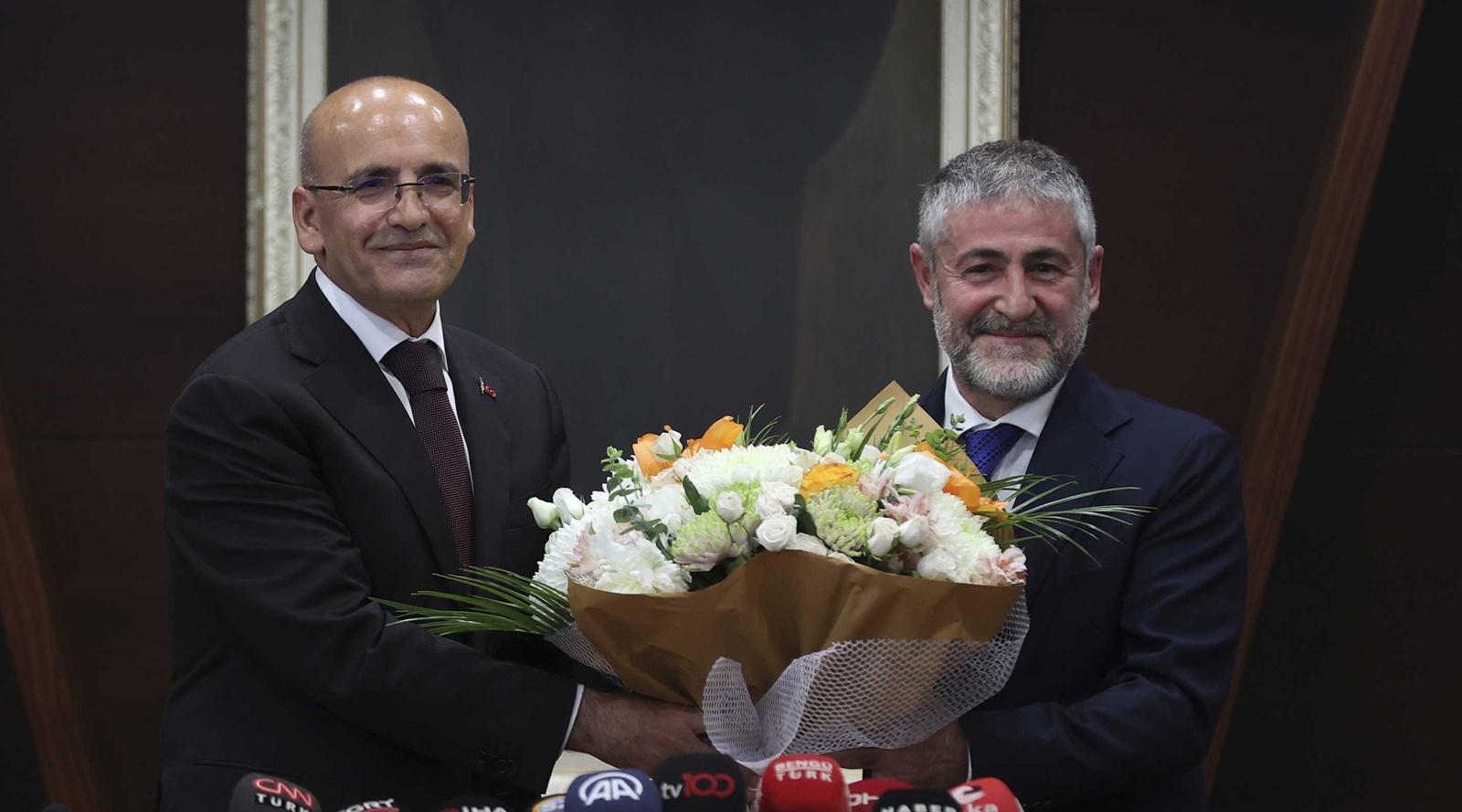What’s in Mehmet Şimşek’s “Economy Action Plan”?
The details of the "Economic Action Plan" to be implemented in the new period by the economy management determined by the new Presidential Cabinet have been announced.

The new economic management in the Presidential Cabinet announced by President Recep Tayyip Erdoğan has been clarified.
According to this; Minister of Treasury and Finance Mehmet Şimşek, Minister of Labor and Social Security Vedat Işıkhan, Minister of Energy and Natural Resources Alparslan Bayraktar, Minister of Industry and Technology Mehmet Fatih Kacır, Minister of Agriculture and Forestry İbrahim Yumaklı, Minister of Trade Ömer Bolat, Minister of Transport and Infrastructure Abdulkadir Uraloğlu. implement the pre-determined economic policies.
The first messages that Şimşek gave at the ceremony when he took over the ministry were also evaluated as the signs of the strategy to be followed. Stating that transparency, consistency, predictability and compliance with international norms will be the main principles in achieving the goal of raising social welfare, Şimşek said that they will prioritize macro-financial stability by strengthening institutional quality and capacity in a conjuncture where global challenges and geopolitical tensions increase.
Şimşek informed that they will start working on the Medium Term Program without wasting time.
ECONOMY ACTION PLAN IS COMING
The AK Party’s declaration titled “The Right Steps for the Century of Turkey” announced before the election and the Medium Term Program for the years 2023-2025 also serve as a guide that includes the priorities and main headings of the economic policy to be followed for the next period. In this context, the instruments to be used to achieve the goals, the projects to be implemented and the roadmap to be followed are expected to be shaped by the new economy management.
It is stated that the agenda of the new economy management, especially the Ministry of Treasury and Finance, will include steps to combat inflation, strengthen the capital markets and investment climate, and reduce the current account deficit.
In order to implement a stable and strong economy, predictable, transparent and effective set of policies with a determined political will, the “Economic Action Plan” will be implemented as a roadmap for 5 years.
FIGHTING INFLATION AND SOCIAL WEALTH
The primary topic of the new period will be the fight against inflation. In addition, it is aimed to protect social welfare during the said struggle by increasing the incomes of low-income people, civil servants, public workers and retirees, especially those with low income.
In the medium term, it is expected that the tools of economic policies will be used with a holistic approach in order to reduce inflation to below 25 percent for the end of 2023 and to single digits again until the end of 2025 in line with the targets in the Medium Term Program.
In line with this target, efforts will be made to prevent volatility in food prices by strengthening agricultural production, efficiency and logistics planning. In parallel with the policies to reduce foreign dependency in energy, it is aimed to reduce the energy costs reflected on the households.
RENTAL INCREASES
Preventing the exorbitant increase in rental expenditures, which has an important place in the expenditure composition of low-income individuals, and continuing social housing projects for this will be among the policies.
“Sustainable growth” will also be one of the primary goals of the new economy management. In this context, it is foreseen that steps will be taken with the aim of reaching a national income size of 1.5 trillion dollars and a per capita income of 16 thousand dollars by the end of 2028, with an annual average growth of 5.5 percent in the 2024-2028 period.
Structural reforms will also be implemented, which will make the increase in total factor productivity, which is demanded by the business world, permanent.
It is aimed to increase production capacity and productivity-based growth by paving the way for public and private sector investments.
While it is aimed to gradually decrease the unemployment rate with the increase in employment, works will be carried out in line with the target of increasing the total employment to 36 million with an additional 6 million employments and reducing the unemployment rate below 7 percent by 2028.
CURRENT DEFICIT AND RESERVES
Measures will be taken to reduce the pressure of foreign exchange demand on imported prices by reducing the current account deficit. Financial instruments that will increase savings in Turkish lira will be developed and supported.
In line with the investment, employment, production and export targets for price stability, selective credit practices will continue at affordable costs to the real sector.
Considering the earthquakes in Kahramanmaraş, which is described as the “disaster of the century”, and the new expenditures required by this, a comprehensive program is planned to be put into use to increase efficiency and savings in public finances.
Incentives and supports will be simplified and restructured. It will be aimed to strengthen the Treasury cash reserve by further expanding the Single Treasury Institutions Account application.
A system that will support digital transformation in the tax system and based on environmentally friendly green taxation will be established, and tax policies will be carried out in two main axes: growth and social justice.
Tax policies that encourage the participation of young people, women and disadvantaged groups in the workforce and entrepreneurship will be prioritized, and selective and target-oriented tax incentives will be continued.
Existing taxes will be regulated by taking into account the European Union’s Border Carbon Regulation Mechanism and the developments in the international arena on climate change, so that those with less carbon emissions will receive less tax.
RECONSTRUCTION OF KITS
The immovable portfolio included in the scope and program of privatization will be evaluated using capital market instruments other than classical privatization methods, and the revenues of public immovables and infrastructure facilities will be shared with investor citizens.
In this context, capital market instruments will come to the fore in privatization practices, state-owned enterprises will be restructured and made ready for public offering within the framework of corporate governance principles.
A new system for the protection of private sector investments will be implemented in order to reduce bureaucracy and produce quick solutions to the problems encountered in the investment process. An “Investment Dispute Authority” will be established to facilitate and accelerate private sector investments.
ISTANBUL FINANCIAL CENTER
A qualified and multidimensional financial service ecosystem will be created with the Istanbul Finance Center (IFC) Project, which was opened with the aim of making Istanbul the leading center of global finance and international trade. Steps will be taken for transformation and diversity in the field of finance.
By diversifying non-banking financial elements, the share of banking in the financial sector will be brought to levels close to international norms.
The Financial Architecture and Infrastructure Strengthening Program will be carried out, and the actions within the scope of the program will be implemented under 7 themes as capital markets, insurance, participation finance, sustainable finance, financial technologies, risk management and financial education.
With capital market actions, emphasis will be placed on instrument diversity, broadening the base, strengthening the legislative infrastructure, expanding liquidity opportunities and increasing the efficiency of venture capital, and increasing the attractiveness of capital markets.
Fintech applications in financial services will be expanded and service quality will be increased.
‘COMMITTEE’ AND ‘RATING SYSTEM’ IN PARTICIPATION FINANCE
Participation finance field will be strengthened, an independent Participation Finance Law will be prepared within this framework, the participation finance sector, which is regulated under various laws, will be gathered under a single roof and the Central Advisory Board will be implemented at international standards for all sectors under participation finance. “Participation finance rating” system will be implemented.
The institutional infrastructure of the financial sector will be deepened. In this context, new audit practices and methods focused on “supervisory technologies”, suitable for the size, complexity and development of the financial sector, will be implemented.
Participation in environmental, social and governance (ESG) markets will accelerate in order to develop sustainable financing opportunities.
In this context, Development and Investment Bank and Eximbank will be subjected to a strong institutional reform process, taking into account international best practice examples.
Within the scope of harmonization with the European Green Agreement, strategy formulation, corporate structuring, risk management, reporting and public information broadcast activities will be carried out for the development of green banking practices.
The technological infrastructure will be strengthened in order to prevent manipulative and market-distorting transactions, keeping the protection of investors and the development of the capital market at the forefront.
The Investor Risk Tracking System will be implemented in order to monitor the risks of investors in a holistic manner and to share them with sector stakeholders with a structure similar to the risk center in banking.
With political and economic stability, predictability and investor-friendly policies, foreign direct investment in high-tech and more productive areas will be increased, and the business and investment environment will be improved.


